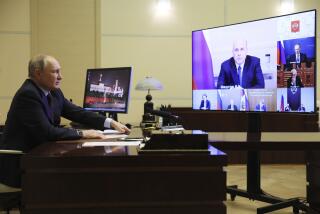No Instant Rubber Stamp : Soviet Parliament’s New Task: Debating a Treaty
- Share via
MOSCOW — A senior Soviet official said Tuesday that the recently approved Soviet-American treaty aimed at scrapping ground-launched intermediate-range missiles will be dealt with in an unusual manner by Soviet lawmakers.
Vadim V. Zagladin, secretary of the Foreign Relations Commission of the Supreme Soviet and deputy chairman of the Communist Party’s International Department, told a press conference that the Supreme Soviet, the nation’s nominal Parliament, will conduct elaborate hearings on the treaty and then ratify it.
This procedure, apparently unprecedented, appears to be intended to duplicate the 200-year-old U.S. system under which treaties do not take effect until ratified by the Senate.
In the past, the Supreme Soviet has given virtually rubber-stamp approval to treaties signed by the Soviet leader. Also, the Supreme Soviet almost invariably gives its unanimous approval to proposals put forth by the party leadership.
But, Zagladin said, a special subcommission will call experts, government and nongovernment, to testify on the intermediate-range nuclear forces (INF) treaty.
The subcommission will report its findings to a plenary of the Supreme Soviet, all 1,500 members, which will then debate the treaty’s merits, he said. Finally, the treaty will be sent to the governing 17-member Presidium of the Supreme Soviet, which will hear testimony from Defense Minister Dmitri T. Yazov and other top government officials.
At least a month will be needed, Zagladin said, before the subcommission decides to send its findings to the Supreme Soviet.
Asked whether amendments to the treaty could be proposed, Zagladin said, “We hardly expect that.” But members of the Supreme Soviet have “certain questions,” he said, without elaborating, and they want to give the treaty a “very thorough examination.”
Ordinary Soviet citizens have expressed concern that the treaty will require that Moscow destroy many more nuclear warheads and missiles than the United States. Soviet leaders have said that the disparity will not weaken the Soviet Union militarily.
Part of the ratification process may be televised, Zagladin said, and part may be held behind closed doors. He pointed out that this is also customary in parliamentary bodies in other countries.
Zagladin said he feels that the main issues will be the extent and reliability of the verification process and the impact on national security.
U.S. Senate hearings on the treaty, he said, will be observed closely in the Soviet Union.
He said he thinks there is no mystery about how the treaty will fare in the Supreme Soviet, and added: “One can hardly doubt that (it) will be ratified.” Asked why it is to be subjected to such close scrutiny if there is no doubt about its being ratified, he replied:
“The discussion will be very thorough because this is the first treaty that envisages actual reduction of nuclear forces. We salute that step, but it does require very thorough examination.”
More to Read
Sign up for Essential California
The most important California stories and recommendations in your inbox every morning.
You may occasionally receive promotional content from the Los Angeles Times.













